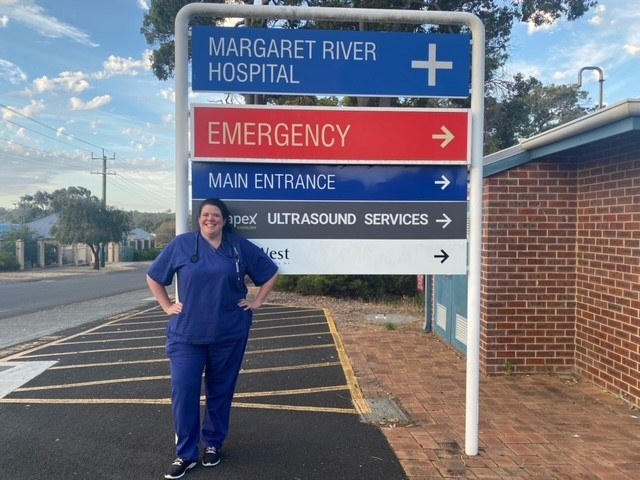Dr Heidi Tudehope
How did your rural pathway commence? I cobbled together the experiences I needed on a list and set about pursuing them. It was not always easy or clear. I started before the RGPWA was established, and I hope the pathway has made this much easier to navigate for the next gen. I didn't initially want to work as a rural generalist, but I think it was inside of me and found ways to burst out eventually! When did you get your first taste of rural work? As a nurse in the early 2000s I worked rurally in a few places, e.g. Bridgetown in WA, Atherton in QLD and Christmas Island. I backed it up with a job supporting Aboriginal Health so have seen most of the most very remote spots in the country over the seven years I was in that job. What did your training pathway look like from medical school graduation to rural generalist? After intern/junior doctor time, I did my postgraduate emergency medicine training through the Australian College of Emergency Medicine (ACEM), obstetrics and gynaecology through the Royal Australian and New Zealand College of Obstetricians and Gynaecologists (RANZCOG) and then GP training through the Royal Australian College of General Practitioners (RACGP). I am really glad I decided to do rotations in pretty much every specialty in the regional hospital upstream from where I work now, so I was able to get a very good understanding of specialty areas, referral pathways and resources that I now use every day. I’m also so grateful I was able to do six months in paediatrics and neonates at a large regional hospital, which I highly recommend to anyone interested in advanced skills in obstetrics or emergency medicine where you might be the only one around to resus a neonate or small child. I was advised by a trusted friend to do advanced skills first – and I’m glad I did this, because it meant I could keep my hand in with 1-2 days of work a week in emergency medicine or obstetrics, while then turning my attention to GP. GP is still the hardest thing I have ever done, it’s just so broad and limitless, and is so much more than clinical work – you also have to learn how to effectively run a small business. I was also able to complete all of my GP registrar time in the country which was great – so I was able to still work in emergency medicine and obstetrics at my local hospital and keep in touch with these skills while tackling the epic job of GP training. What aspect of your personality suits being a rural generalist with your advanced skills? I like people! My favourite area to work is a country ED – it’s a team sport, and I have a sensational team that I get to work with. I love the breadth of it – never a dull moment! It’s also immensely satisfying to provide the all-round care that we do – I can see a patient in ED, look after them on the ward and follow them up in clinic after discharge. Very cool. Is there a certain temperament that suits being a rural generalist? Yes, though there are a broad range of qualities that all have something to add, so it does take a lot of different temperaments to make up a well-rounded team. You have to like working as a team (one of my favourite parts!), although we are all GPs, the additional skills for the most part require roster flexibility and shift work – it’s not very often you’ll find it a 9-5 gig if you want to use your advanced skills. Even if it’s a FIFO job, for at least some of the time (or all of the time, for many of us) you will be living in the community you are serving. So, being anonymous rarely happens – you’ll need to be approachable and not mind a lot of hellos when you are doing your shopping (I actually find this quite lovely). How do you think your family and friends would describe you? I had no idea, had to do a little survey – my favourite answer was “funny and silly in the way only real grown-ups can be”. Also, “the most sophisticated and intelligent person I know who still laughs at farts”. When you’re not at work, what do you do with your free time? I’m trying very hard to learn how to relax. More than a decade of study was hard to wind down from – I’m embracing the headspace and learning languages, music and rediscovering reading for fun. I’ve also joined an ocean swimming club – now I have to put on my big-girl pants and get over my fear of it and go! What are the hours like working as a rural generalist? Very varied – can be a choose your own adventure to some extent, but then again, we have to cover a hospital 24/7 so no escaping night shift. In a week I will usually work in clinic, a day in theatre, ED shifts and sometimes a run of ward cover, it changes from week-to-week – but I really enjoy having a bit fixed, a bit flexible. What is your favourite thing about the region you live in? Definitely the community, followed by the weather and the outdoors – stunning forest and beaches. Lots and lots of wineries. Mostly, though, what it offers that the city doesn’t, is the ability to work as a rural generalist. What does a rural generalist eat for lunch? Leftovers! If you could meet anyone in the world dead or alive, who would that be and why? Matthew Bellamy, Chris Cheney and Neil Finn – my holy trinity of gods of music, just so I can worship them in person.

Photo: Dr Heidi Tudehope on a regular workday.

